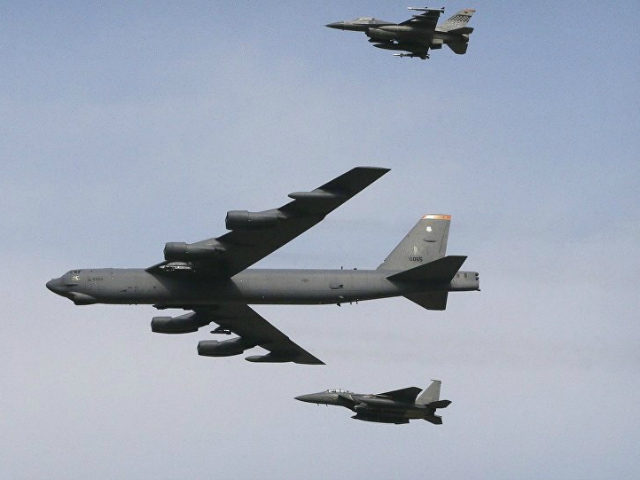The U.S. Air Force, in a likely response to Russian aggression, announced that it deployed six nuclear-capable B-52 bombers to Europe last week for “theater integration and flying training” exercises with NATO allies and partners, a move that has irked the Kremlin.
On Wednesday, the U.S. Air Force revealed in a press release that B-52 bombers were flying coordinated missions from Indo-Pacific, home to tensions between America and China, and Europe, where United States-Russia hostilities remain alive and well.
The U.S. Air Force noted:
Collectively, the flights from the Indo-Pacific and Europe demonstrated U.S. commitment to allies and partners through the global employment of military forces.
The U.S. deployed B-52s the Indo-Pacific as China militarizes man-made islands and continues to engage with territorial disputes with American allies in the area’s South China Sea. Russia also has an interest in the region.
In the press release, the Air Force further explained that the B-52s deployed to Europe to “conduct training with NATO allies and partners in order to enhance interoperability and readiness. … Strategic bomber missions enhance the readiness and training necessary to respond to any potential crisis or challenge across the globe.”
Early this month, Gen. Curtis Scaparrotti, the U.S. European Command (EUCOM) head and NATO’s supreme allied commander in Europe, painted a grim picture of America’s standing ability to credibly deter Russian aggression in the region, noting that Moscow’s efforts to modernize its armed forces are eroding the United Sates’s military advantage in Europe.
America’s B-52 deployments came as Russia celebrated the fifth anniversary of its annexation of Crimea from Ukraine, which has triggered a war between Kremlin-backed separatists and forces loyal to the Ukrainian government that has killed and wounded thousands, CNN noted.
The U.S. nuclear-capable deployment further fuels ongoing tensions between Russia and the United States, the state-run TASS News agency reported Thursday.
Dmitry Peskov, a spokesman for Russian President Vladimir Putin told reporters about the B-52 deployment to Europe, “It goes without saying that such actions by the United States by no means strengthen the climate of security and stability in a region adjoining Russia. On the contrary, this breeds more tensions. We find such actions by Washington regrettable.”
China has also warned against the naval presence of the U.S. and its Western allies in the South China Sea.
Last week, Gen. Curtis Scaparrotti stressed the necessity to keep tabs on Russia-China military cooperation in Europe. Under Trump, the U.S. is mainly prioritizing combating America’s strategic competitors, Russia and China, while keeping the pressure of lingering jihadi groups.
The U.S. Air Force announced last week:
A Bomber Task Force deployment of B-52 Stratofortress aircraft, Airmen and support equipment from the 2nd Bomb Wing, Barksdale Air Force Base, Louisiana, have arrived in the U.S. European Command area of operations for a deployment to conduct theater integration and flying training, March 14.
…
The deployment also includes joint and allied training in the U.S. European Command theater to improve bomber interoperability. Training with joint partners, allied nations and other U.S. Air Force units contributes to our ready and postured forces and enables us to build enduring and strategic relationships necessary to confront a broad range of global challenges.
The B-52 is in the process of undergoing upgrades to make the subsonic heavy bomber that remains the mainstay of America’s strategic fleet after more than 50 years of service more lethal.
Relying on Boeing, the U.S. Air Forces is seeking to equip the B-52s with Long Range Stand-Off (LRSO) Cruise Missile and allow them to carry more smart bombs as part of what top military brass considers much-needed upgrades expected to cost up to $11.9 billion over eight years. However, as of this week, no funds have been approved for the modernization, which the U.S. military believes falls behind China and Russia.

COMMENTS
Please let us know if you're having issues with commenting.